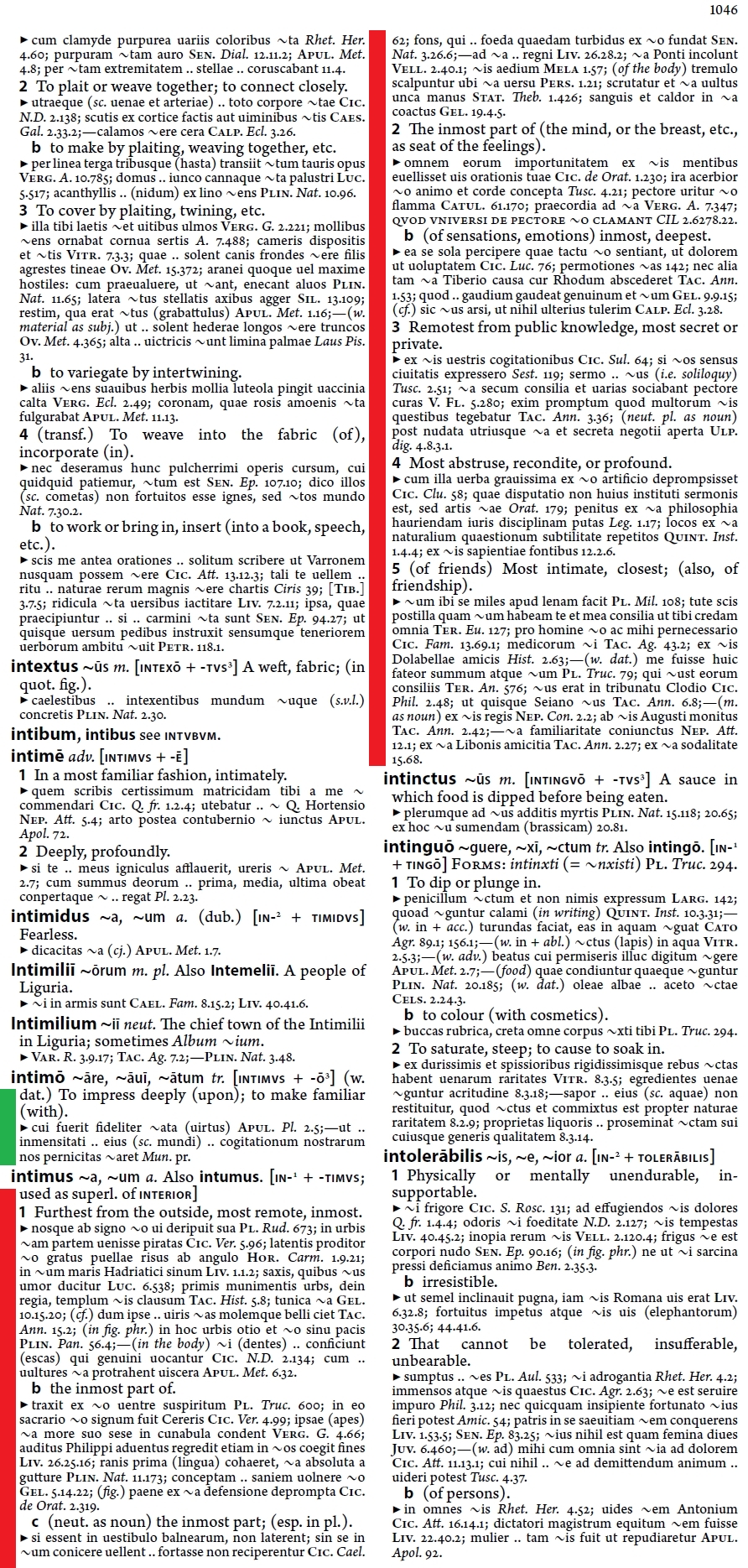Post History
How did intimus "inmost, innermost, deepest" (adj.) semantically shift to 🡺 intimare "make known, announce, impress" ? These meanings are polar opposites! If something is inmost, then it's private...
#3: Post edited
- How did _intimus_ **"inmost, innermost, deepest" (adj.)** semantically shift to 🡺 _intimare_ **"make known, announce, impress"** ?
These meanings are polar opposites! If something is inmost, then it's private or secret — and you would not "make known" or "announce" it!- >## intimate (adj.) [on Etymonline](https://www.etymonline.com/word/intimate?ref=etymonline_crossreference#etymonline_v_12152)
- >
- >1630s, "closely acquainted, very familiar," also "inmost, intrinsic,"
- from Late Latin _intimatus_, past participle of _intimare_ **"make known, announce, impress,"**
- from Latin _intimus_ **"inmost, innermost, deepest" (adj.)**, also used figuratively, of affections, feelings, as a noun, "close friend;" superlative of in "in"
- (from PIE root [\*en](https://www.etymonline.com/word/*en?ref=etymonline_crossreference) "in").
- I scanned _Oxford Latin Dictionary_ (2 ed. 2012), p. 1046. below.
- 
- How did _intimus_ **"inmost, innermost, deepest" (adj.)** semantically shift to 🡺 _intimare_ **"make known, announce, impress"** ?
- These meanings are polar opposites! If something is inmost, then it's private — and you wouldn't "make known" or "announce" a secret!
- >## intimate (adj.) [on Etymonline](https://www.etymonline.com/word/intimate?ref=etymonline_crossreference#etymonline_v_12152)
- >
- >1630s, "closely acquainted, very familiar," also "inmost, intrinsic,"
- from Late Latin _intimatus_, past participle of _intimare_ **"make known, announce, impress,"**
- from Latin _intimus_ **"inmost, innermost, deepest" (adj.)**, also used figuratively, of affections, feelings, as a noun, "close friend;" superlative of in "in"
- (from PIE root [\*en](https://www.etymonline.com/word/*en?ref=etymonline_crossreference) "in").
- I scanned _Oxford Latin Dictionary_ (2 ed. 2012), p. 1046. below.
- 
#2: Post edited
How did _intimus_ **"inmost, innermost, deepest" (adj.)** semantically shift to 🡺 _intimare_ **"make known, announce, impress,"** ?- These meanings are polar opposites! If something is inmost, then it's private or secret — and you would not "make known" or "announce" it!
- >## intimate (adj.) [on Etymonline](https://www.etymonline.com/word/intimate?ref=etymonline_crossreference#etymonline_v_12152)
- >
- >1630s, "closely acquainted, very familiar," also "inmost, intrinsic,"
- from Late Latin _intimatus_, past participle of _intimare_ **"make known, announce, impress,"**
- from Latin _intimus_ **"inmost, innermost, deepest" (adj.)**, also used figuratively, of affections, feelings, as a noun, "close friend;" superlative of in "in"
- (from PIE root [\*en](https://www.etymonline.com/word/*en?ref=etymonline_crossreference) "in").
- I scanned _Oxford Latin Dictionary_ (2 ed. 2012), p. 1046. below.
- 
- How did _intimus_ **"inmost, innermost, deepest" (adj.)** semantically shift to 🡺 _intimare_ **"make known, announce, impress"** ?
- These meanings are polar opposites! If something is inmost, then it's private or secret — and you would not "make known" or "announce" it!
- >## intimate (adj.) [on Etymonline](https://www.etymonline.com/word/intimate?ref=etymonline_crossreference#etymonline_v_12152)
- >
- >1630s, "closely acquainted, very familiar," also "inmost, intrinsic,"
- from Late Latin _intimatus_, past participle of _intimare_ **"make known, announce, impress,"**
- from Latin _intimus_ **"inmost, innermost, deepest" (adj.)**, also used figuratively, of affections, feelings, as a noun, "close friend;" superlative of in "in"
- (from PIE root [\*en](https://www.etymonline.com/word/*en?ref=etymonline_crossreference) "in").
- I scanned _Oxford Latin Dictionary_ (2 ed. 2012), p. 1046. below.
- 
#1: Initial revision
What semantic notions underlie "inmost, innermost" (intimus) 🡲 with "make known, announce" (intimo)?
How did _intimus_ **"inmost, innermost, deepest" (adj.)** semantically shift to 🡺 _intimare_ **"make known, announce, impress,"** ? These meanings are polar opposites! If something is inmost, then it's private or secret — and you would not "make known" or "announce" it! >## intimate (adj.) [on Etymonline](https://www.etymonline.com/word/intimate?ref=etymonline_crossreference#etymonline_v_12152) > >1630s, "closely acquainted, very familiar," also "inmost, intrinsic," from Late Latin _intimatus_, past participle of _intimare_ **"make known, announce, impress,"** from Latin _intimus_ **"inmost, innermost, deepest" (adj.)**, also used figuratively, of affections, feelings, as a noun, "close friend;" superlative of in "in" (from PIE root [\*en](https://www.etymonline.com/word/*en?ref=etymonline_crossreference) "in"). I scanned _Oxford Latin Dictionary_ (2 ed. 2012), p. 1046. below. 


















